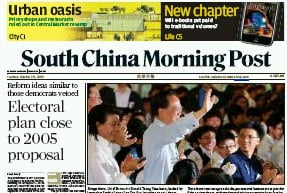
Citing anonymous pro-Beijing sources briefed by mainland officials, the South China Morning Post reports that next month’s constitutional reform proposals for Hong Kong will be similar to those vetoed by pro-democrats in late 2005. There is probably some expectations-management going on here; Chief Executive Donald Tsang’s extremely limited repertoire of political tricks revolves around disingenuous leaks to the press. Four years ago, his administration tended to downplay the possibility of serious change in an ultimately unsuccessful attempt to make the proposed electoral package for 2007-08 look more meaningful than it really was. This time perhaps he will do the opposite: try to condition everyone to expect a 90%-identical package for the CE and Legislative Council elections in 2012, then produce one that’s 40% different.
‘Difference’ here is purely cosmetic and nothing to do with the relative degree of democracy contained in any proposal. It must be tempting for Donald to produce a highly similar package simply out of spite, to rub the pro-democrats’ noses in it and ‘punish’ them and everyone else for rejecting the non-reforms the first time round. He lost horrible amounts of face at that time and the humiliation seems to burn still. But if the aim is to get the public to blame the pro-democrats for any lack of progress, the government needs something with a better chance of being passed off as progress.
Either way, it won’t be progress. Elections in the Big Lychee are rigged to produce outcomes acceptable to Beijing. China is a one-party state, and the ruling communist regime is not going to allow the faintest chance that one city, even a highly autonomous one, could end up with a mayor or assembly that it cannot control with certainty. Universal suffrage, by definition, introduces such a possibility and therefore cannot and will not happen. Democratic elections in Hong Kong and Communist Party rule of the PRC are incompatible: you can have one or the other, but not both.
Pro-democrats refuse to accept this truth, bleating incessantly that Beijing promised us universal suffrage; and so they keep on fighting, apparently relishing in their delusion and denial. The establishment and pro-Beijing camp play along with the charade – pretending for example that lack of consensus locally is holding up reform – because they can’t voice the truth and imply or admit that Beijing was lying, or has changed its mind, or was misquoted or misunderstood.
As we get closer to the dates when universal suffrage is supposed to become possible (2017 for CE, 2020 for Legco), someone will have to come clean about this, because the numbers will look less and less convincing. At the moment, some 220,000 people essentially elect a make-believe electoral college of 800 who are allowed to participate in the pretend-election that endorses Beijing’s choice of CE. The key is that only a small, trusted and loyal minority of the 220,000 actually choose the overwhelming majority of the 800. It is possible to appear to expand the franchise by increasing these numbers while maintaining the structure that rigs the outcome of the elections. But at some stage as the figure rises from 220,000 (or 800) to all registered voters (currently 3.4 million), the scale on which the majority will is thwarted will become a complete joke.
The first side to point this out, and demand that we scrap the whole sham of a political reform process at least until China adopts a multiparty system, is the winner. But it is a race between the unrealistic and the dishonest, and each is trying to lose.
